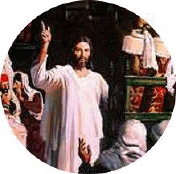 "But in vain they do worship me, teaching for doctrines the commandments of men."
Matthew 15:9
"But in vain they do worship me, teaching for doctrines the commandments of men."
Matthew 15:9
Lesson #15
HOW SUNDAY KEEPING BEGAN
Sunday is the first day of the week. Saturday is the seventh day of the week. The question in this lesson is Who changed the Sabbath from Saturday to Sunday? This is important because the observance of the seventh-day Sabbath is commanded by God in the fourth commandment of the Decalogue (Exodus 20:8-11). Did God give His sanction for the change from the seventh to the first day of the week?
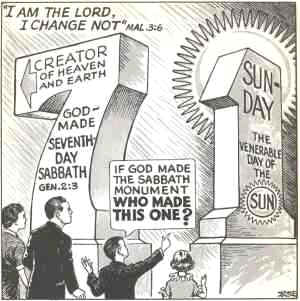 1 - IF THE CHANGE IS VALID, WHO AUTHORIZED IT?
1 - IF THE CHANGE IS VALID, WHO AUTHORIZED IT?
Authority for the change should be found in the Bible. Since we are Bible Christians, this goes without saying that it is more authoritative with us than a dictionary is for spelling and definitions. Dictionaries change, but "the Word of our God shall stand for ever" (Isaiah 40:8).
Shall we build on the early Church Fathers? These are such men as Clement, Polycarp, Justin Martyr, Irenaeus, and Tertullian. Some of them lived in the second century and some later. Some theologians try to prove doctrine by quoting these early Church Fathers.
Dr. Adam Clarke says in his commentary:
"But of these [the Fathers] we may safely state, that there is not a truth in the most orthodox creed that cannot be proved by their authority, nor a heresy that has disgraced the Romish Church, that may not challenge them as its authors. In points of doctrine their authority is, with me, nothing. The Word of God alone contains my creed" (Comment on Proverbs 8).
If the Bible gives no testimony, there is no light.
Isaiah 8:20- "To the law and to the testimony: if they speak not according to this Word, it is because there is no light in them."
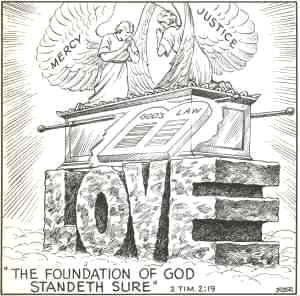 2 - COULD GOD CHANGE HIS OWN LAW?
2 - COULD GOD CHANGE HIS OWN LAW?
The law of God is as sacred as the Lawgiver Himself. It is a revelation of His gracious will, a transcript of His character, the expression of His infinite love and wisdom. The death of Christ on Calvary to redeem us from the curse, or penalty, of the law forever proves that God could not change His law, not even to save His Son. The following facts prove that this is true:
1. God does not change.
Malachi 3:6- "I am the Lord, I change not; therefore ye Sons of Jacob are not consumed" (James 1: 17).
2. The Ten Commandments are God's own covenant.
Deuteronomy 4:13- "He declared unto you His covenant. which He commanded you to perform, even Ten Commandments; and He wrote them upon two tables of stone."
3. God will not break His covenant or alter His words.
Psalm 89:34- "My covenant will I not break, nor alter the thing that is gone out of My lips,"
4. He keeps His covenant for a thousand generations.
Deuteronomy 7:9- "Know therefore that the Lord thy God. He is God. the faithful God. which keepeth covenant and mercy with them that love Him and keep His commandments to a thousand generations."
5. God's acts stand forever.
Ecclesiastes 3:14- "I know that, whatsoever God doeth, it shall be for ever: nothing can be put to it, nor anything taken from it: and God doeth it, that men should fear before Him."
 3 - DID JESUS CHANGE THE LAW AND THE SABBATH?
3 - DID JESUS CHANGE THE LAW AND THE SABBATH?
Since Jesus and His Father are one (John 10:30), and since Jesus came to do the will of His Father (John 6:38), it follows that He would do nothing of which His Father would not approve. So He could not have come to change God's eternal law, Christ is the active agent in God's plans, by whom God created all things.
Ephesians 3:9- "And to make all men see what is the fellowship of the mystery, which from the beginning of the world hath been hid in God, who created all things by Jesus Christ" (1 Corinthians 8:6).
Christ, as Creator, made the Sabbath in the beginning. So He would not have come to earth to destroy it.
John 1:1-3- "In the beginning was the Word, and the Word was with God, and the Word was God. The same was in the beginning with God. All things were made by Him; and without Him was not any thing made that was made."
John 1:14- "And the Word was made flesh, and dwelt among us, (and we beheld His glory, the glory as of the only begotten of the Father) full of grace and truth."
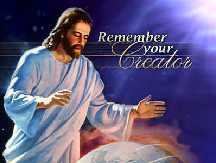 Genesis
2:1-3-
"Thus the heavens and the earth
were finished, and all the host of them. And on the seventh day God ended His
work which He had made; and He rested on the seventh day from all his work which
He had made. And God blessed the seventh day, and sanctified it: because that in
it He had rested from all His work which God created and made,"
Genesis
2:1-3-
"Thus the heavens and the earth
were finished, and all the host of them. And on the seventh day God ended His
work which He had made; and He rested on the seventh day from all his work which
He had made. And God blessed the seventh day, and sanctified it: because that in
it He had rested from all His work which God created and made,"
Keep in mind that it was Christ who gave the law at Mount Sinai. This is taught by the following two Scripture texts, when placed together:
Nehemiah 9:12-13- "Moreover thou leddest them in the day by a cloudy pillar. and in the night by a pillar of fire. to give them light in the way wherein they should go. Thou camest down also upon mount Sinai. and spakest with them from heaven. and gavest them right judgments. and true laws, good statutes and commandments."
1 Corinthians 10:4- "And did all drink the same spiritual drink: for they drank of that spiritual Rock that followed them: and that Rock was Christ."
And, while He was on earth, Jesus walked in harmony with God's laws. Note these six vital facts:
 1. He kept His Father's commandments.
1. He kept His Father's commandments.
John 15:10- "lf ye keep My commandments. ye shall abide in My love; even as I have kept My Father's commandments, and abide in His love."
Jesus did no sin (1 Peter 2:22). "Sin is the transgression of the law" (1 John 3:4). Therefore, He could not have broken the Sabbath commandment, as some profanely say.
2. He came to fulfill (keep) the law, not to destroy it.
Matthew 5:17-19- "Think not that I am come to destroy the law. or the prophets: I am not come to destroy, but to fulfil. For verily I say unto you, Till heaven and earth pass, one jot or one tittle shall in no wise pass from the law. till all be fulfilled. Whosoever therefore shall break one of these least commandments, and shall teach men so, he shall be called the least in the kingdom of heaven: but whosoever shall do and teach them, the same shall be called great in the kingdom of heaven."
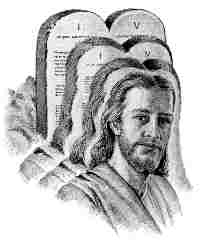 3. He came to magnify the law.
3. He came to magnify the law.
Isaiah 42:21- "The Lord is well pleased for His righteousness' sake; He will magnify the law, and make it honourable," (Read Matthew 5:21-22,27-28.)
4. He Himself kept the Sabbath.
Luke 4:16- "He came to Nazareth, where He had been brought up: and, as His custom was, He went into the synagogue on the Sabbath day, and stood up for to read."
5. He openly ignored the Jewish Sabbath laws not found in the Bible. Read Luke 6:1-11.
6. He indicated that the Sabbath would be sacred forty years after the cross.
Matthew 24:20- "But pray ye that your flight be not in the winter, neither on the Sabbath day."
Jesus admonished His followers to pray that their flight from Jerusalem should not be on the Sabbath day (Matthew 24:20). Jesus knew that this flight (AD. 70) would occur some forty years after His return to heaven.
It is completely conclusive that the unholy deed of attempting to change God's everlasting, holy law cannot be charged to His holy Son, Jesus.
 4 - DID PAUL CHANGE GOD'S LAW OR SABBATH?
4 - DID PAUL CHANGE GOD'S LAW OR SABBATH?
Said the great apostle:
Romans 3:31- "Do we then make void the law through faith? God forbid: yea, we establish the law."
We find Paul exclaiming about the established law. This he could not have done had it been abolished. The thought of abrogating the law was repulsive to the apostle. "God forbid!" he says.
The yearly sabbaths of Colossians 2: 16 will be explained in the next study.
5 - DO MEN CLAIM THERE IS BIBLE PROOF FOR THE CHANGE?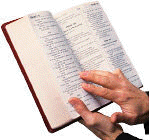
1. Catholics say there is absolutely no Bible proof.
Cardinal Gibbons declared:
"You may read the Bible from Genesis to Revelation, and you will not find a single line authorizing the sanctification of Sunday. The Scriptures enforce the religious observance of Saturday."- The Faith of Our Fathers (110th ed.), p. 89.
"Sunday is a Catholic institution, and its claims to observance can be defended only on Catholic principles. . From the beginning to end of Scripture, there is not a single passage that warrants the transfer of weekly public worship from the last day of the week to the first. (Catholic Press [Sydney, Australia], August 25, 1900).
2. Protestants say there is no Bible text.
(In an article about the Sabbath, Smith and Cheetham say:
"The notion of a formal substitution [of the first for the seventh day] and the transference to it, perhaps in a spiritualized form, of the sabbatical obligation established by . . the fourth commandment, has no basis whatever, either in Holy Scripture or in Christian antiquity.. (Smith and Cheetham's Dictionary of Christian Antiquities).
Dr. R. W. Dale (Congregationalist) says:
"It is quite clear that however rigidly or devoutly we spend Sunday, we are not keeping the Sabbath. . The Sabbath was founded on a specific Divine command. We can plead no such command for the obligation to observe Sunday. . There is not a single sentence in the New Testament to suggest that we incur any penalty by violating the supposed sanctity of Sunday" (The Ten Commandments, pages 100-101).
Dr. Edward T. Hiscox, author of The Baptist Manual:
"There was and is a commandment to keep holy the Sabbath day, but that Sabbath day was not Sunday. It will be said, however, and with some show of triumph, that the Sabbath was transferred from the seventh to the first day of the week. . Where can the record of such a transaction be found? Not in the New Testament, absolutely not.. (in a paper read before a New York Ministers' Conference held November 13, 1893).
 3. Historians testify likewise.
3. Historians testify likewise.
Article regarding the Sabbath, Chamber's Encyclopedia (1880): "Unquestionably the first law, either ecclesiastical or civil. by which the sabbatical observance of that day is known to have been ordained, is the edict of Constantine, A.D. 321." This Roman emperor had not yet professed Christianity at the time of this edict, and he speaks of Sunday as "the venerable day of the sun."
Augustus Neander, celebrated historian:
"The festival of Sunday, like all other festivals, was always only a human ordinance, and it was far from the intentions of the apostles to establish a divine command in this respect, far from them and from the early apostolic Church to transfer the laws of the Sabbath to Sunday" (The History of the Christian Religion and Church, Rose's translation, p. 186).
If the Sabbath had been changed by God, surely the record of the change would be found in His Word.
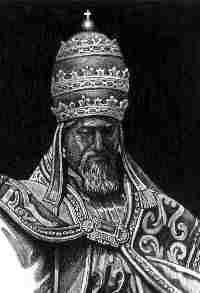 6 - DOES THE CHURCH OF ROME ADMIT SHE MADE THE CHANGE?
6 - DOES THE CHURCH OF ROME ADMIT SHE MADE THE CHANGE?
We return now to the prophecy of Daniel 7 where the little horn, or the papacy, was to "think to change" God's laws.
Daniel 7:25- "He shall speak great words against the Most High, and shall wear out the saints of the most High, and think to change times and laws: and they shall be given into his hand until a time and times and the dividing of time."
Through the prophet Daniel, God foretold the 1,260-year reign of the papacy and its determination to change times and laws. The change has been attempted. That we all know. Does the papacy acknowledge the act? First of all, we turn to the Catholic Mirror of September 23, 1893: 'The Catholic Church, for over one thousand years before the existence of a Protestant, by virtue of her divine mission, changed the day from Saturday to Sunday."
Next we quote Peter Geiermann, From Catholicism's Catechism:
"Q. Which is the Sabbath day?
"A. Saturday is the Sabbath day.
"Q. Why do we observe Sunday instead of Saturday?
"A. We observe Sunday instead of Saturday because the Catholic Church, in the Council of Laodicea (A.D. 336), transferred the solemnity from Saturday to Sunday" (The Convert's Catechism of Catholic Doctrine, p. 50).
The American Sentinel (N.Y.), June 1, 1893, page 173, quotes Thomas Enright, C.S.S.R., of Redemptorist College: "The Bible says, Remember that thou keep holy the Sabbath day. The Catholic Church says, No! By my divine power I abolish the Sabbath day, and command you to keep holy the first day of the week."
The above remarkable statement is an accurate statement of the attitude and objective of Rome toward the Bible Sabbath over the past 1,800 years.
Four facts now stand out in bold relief: (1) The change from Sabbath to Sunday is not authorized in the Bible. (2) God predicted that the papacy would "think to change" God's law. (3) The papacy openly declares that it has changed God's law. (4) The papacy thus exalts itself above God, as foretold by the apostle Paul (2 Thessalonians 2:3-4).
The worship of Mithra, the Persian sun god, was widespread in the Roman Empire in the early centuries after Christ. It had become the leading non-Christian religion; and Christian church leaders in Rome wanted to change the holy day to Sunday, so they could win more Mithraites to the faith.
The influence of Mithraism (sun worship), the existence of the heathen Sunday festival, the rising anti-Jewish sentiment among Christians, the fact that Christians had a tendency to think of the resurrection of Christ with a certain holy joy, the interest of Roman rulers in binding together all religious elements of the empire, and the gradual apostasy of the church, all combined to bring about a gradual change from the observance of God's holy Sabbath to the observance of Sunday.
Thus the Roman emperor. Constantine, passed the first known Sunday law in A.D. 321.
A number of years later, the apostatizing church at the Council of Laodicea (A.D. 336) voted to transfer the solemnity from Sabbath to Sunday as noted above. That council in Canon 29 decreed: "Christians shall not Judaize and be idle on Saturday [the Sabbath], but shall work on that day." This definitely indicates that Christians were still keeping the Sabbath more than three hundred years after Christ's ascension, as scholars have always known.
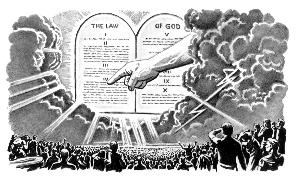 7 -
DO THE SCRIPTURES FORETELL A RESTORATION OF THE
SABBATH?
7 -
DO THE SCRIPTURES FORETELL A RESTORATION OF THE
SABBATH?
The Creator of the universe, who made the seventh-day Sabbath a sign of His power and right to rule, certainly would not leave His Sabbath and to be trampled underfoot forever and His holy law to be mutilated by the mind and hand of man. Isaiah foretold a great call to Sabbath observance. And the teachers of the true Sabbath he called "The repairer of the breach, The restorer of paths to dwell in." Here are his words:
Isaiah 58:12-14- "And they that shall be of thee shall build the old waste places: thou shalt raise up the foundations of many generations; and thou shalt be called, The repairer of the breach, The restorer of paths to dwell in. If thou turn away thy foot from the Sabbath, from doing thy pleasure on My holy day; and call the Sabbath a delight, the holy of the Lord, honourable; and shalt honour Him, not doing thine own ways, nor finding thine own pleasure, nor speaking thine own words: then shalt thou delight thyself in the Lord; and I will cause thee to ride upon the high places of the earth, and feed thee with the heritage of Jacob thy father: for the mouth of the Lord hath spoken it."
As Israel came out of Egypt in the Exodus movement and Christ especially emphasized the Sabbath, so in these last days, after the long dark ages of apostasy, Christ has a Christian movement reaching to the ends of the earth, gathering those who keep all His commandments (Revelation 12:17; 14:6-15).
We must here squarely face the issue. God's law is eternal. Even if it were a changeable law, only God, the Lawgiver, could change it, and His Word affords no such record or permission. A power professing to "hold on this earth the place of God Almighty" asserts that it has the power to change God's law; but Jesus said, "Howbeit in vain do they worship Me, teaching, for doctrines the commandments of men" (Mark 7:7). Would you not rather be on the side of God and Christ and the eternal law that God has promised to write in the heart of every believer?
This question comes into clearer focus as we study all the texts in the New Testament that refer to the first day of the week, the day commonly called Sunday and observed by many as the Christian's rest day. The next lesson is entitled "Sunday in the New Testament."
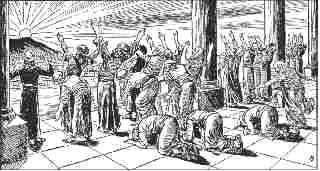
HOW SUNDAYKEEPING BEGAN
" The importance of the Sabbath as the memorial of creation is that it keeps ever present the true reason why worship is due to God'-because He is the Creator, and we are His creatures. 'The Sabbath therefore lies at the very foundation of divine worship, for it teaches this great truth in the most impressive manner, and no other institution does this. The true ground of divine worship, not of that on the seventh day merely, but of all worship, is found in the distinction between the Creator and His creatures. This great fact can never become obsolete, and must never be forgotten."-J. N. Andrews, History oj the Sabbath, chapter 27.
"It was to keep this truth ever before the minds of men, that God instituted the Sabbath in Eden; and so long as the fact that He is our Creator continues to be a reason why we should worship Him, so long the Sabbath will continue as its sign and memorial. Had the Sabbath been universally kept, man's thoughts and affections would have been led to the Creator as the object of reverence and worship, and there would never have been an idolater, an atheist, or an infidel. The keeping of the Sabbath is a sign of loyalty to the true God, 'Him that made heaven, and earth, and the sea, and the fountains of waters,' It follows that the message which commands men to worship God and keep His commandments will especially call upon them to keep the fourth commandment. .
"It is a fact generally admitted by Protestants that the Scriptures give no authority for the change of the Sabbath. This is plainly stated In publications issued by the American Tract Society and the American Sunday School Union. One of these works acknowledges 'the complete silence of the New Testament so far as any explicit command for the Sabbath [Sunday, the first day of the week] or definite rules for its observance are concerned,' "-George Elliott, The Abiding Sabbath, page 184.
"Another says: 'Up to the time of Christ's death, no change had been made in the day'; and, 'so far as the record shows, they [the apostles] did not. . give any explicit command enjoining the abandonment of the seventh-day Sabbath, and its observance on the first day of the week,' "A. E. Waffle, The Lord's Day, pages 186-188.
"Roman Catholics acknowledge that the change of the Sabbath was made by their church, and declare that Protestants by observing the Sunday are recognizing her power. In the Catholic Catechism of Christian Religion, in answer to a question as to the day to be observed in obedience to the fourth commandment, this statement is made: 'During the old law, Saturday was the day sanctified; but the church, instructed by Jesus Christ, and directed by the Spirit of God, has substituted Sunday for Saturday; so now we sanctify the first, not the seventh day. Sunday means, and now is, the day of the Lord.'
"As the sign of the authority of the Catholic Church, papal writers cite 'the very act of changing the Sabbath into Sunday, which Protestants allow of . . because by keeping Sunday, they acknowledge the church's power to ordain feasts, and to command them under sin,' "-Henry Tuberville, An Abridgment of the Christian Doctrine, page 58.
"The Roman Church has not relinquished her claim to supremacy; and when the world and the Protestant churches accept a sabbath of her creating, while they reject the Bible Sabbath, they virtually admit this assumption. They may claim the authority of tradition and of the Fathers for the change; but in so doing they ignore the very principle which separates them from Rome-that 'the Bible, and the Bible only, is the religion of Protestants' . . Romanists declare that 'the observance of Sunday by the Protestants is an homage they pay, in spite of themselves, to the authority of the [Catholic] Church,' "-Mgr. Segur, Plain Talk About the Protestantism of Today, page 213. -Great Controversy, 437-438, 447-448
THE LAW OF GOD
I Thou shalt have no other gods before Me.
II Thou shalt not make unto thee any graven image, or any likeness of anything that is in heaven above, or that is in the earth beneath, or that is in the water under the earth: Thou shalt not bow down thyself to them, nor serve them: for I the Lord thy God am a jealous God, visiting the iniquity of the fathers upon the children unto the third and fourth generation of them that hate Me; and showing mercy unto the thousands of them that love Me, and keep My commandments.
III Thou shalt not take the name of the Lord thy God in vain; for the Lord will not hold him guiltless that taketh His name in vain.
IV Remember the Sabbath day, to keep it holy. Six days shalt thou labor, and do all thy work; but the seventh day is the Sabbath of the Lord thy God. In it thou shalt not do any work, thou, nor thy son, nor thy daughter, thy manservant, nor thy maidservant nor thy cattle, nor thy stranger that is within thy gates. For in six days the Lord made heaven and earth, the sea, and all that in them is, and rested the seventh day: wherefore the Lord blessed the Sabbath day, and hollowed it
V Honor thy father and thy mother: that thy days may be long upon the land which the Lord thy God giveth thee.
VI Thou shalt not kill.
VII Thou shalt not commit adultery.
VIII Thou shalt not steal.
IX Thou shalt not bear false witness against thy neighbor.
X Thou shalt not covet thy neighbor's house; thou shalt not covet thy neighbor's wife, nor his manservant, nor his maidservant, nor his ox, nor his ass, nor anything that is thy neighbor's. -Exodus 20:3-17
THE LAW OF GOD AS CHANGED BY MAN
I - I am the Lord thy God. Thou shalt not have strange gods before Me.
[The Second Commandment has been left out]
II [actually III] Thou shalt not take the name of the Lord thy God in vain.
III [actually IV] Remember that thou keep holy the Sabbath day. [The Sabbath Commandment has been changed.]
IV [actually V] Honor thy father and thy mother.
V [actually VI] Thou shalt not kill.
VI [actually VII] Thou shalt not commit adultery.
VII (actually VIII) Thou shalt not steal.
VIII [actually IX . First Part] Thou shalt not covert thy neighbor's wife.
X [X . Second Part] Thou shalt not covet thy neighbor's goods.
-The General Catholic Catechism
"Q.-Have you any other way of proving that the [Catholic] Church has power to institute festivals of precept?
"A.-Had she not such power. . she could not have substituted the observance of Sunday, the first day of the week for Saturday, the seventh day, a change for which there is no scriptural authority."-Doctrinal Catechism, p. 174 [Roman Catholic].
"Prove to me from the Bible alone that I am bound to keep Sunday holy. There is no such law in the Bible. It is a law of the holy Catholic Church alone. The Bible says 'Remember the Sabbath day to keep it holy.' The Catholic Church says, No. By my divine power I abolish the Sabbath day and command you to keep holy the first day of the week. And lo! The entire civilized world bows down in reverent obedience to the command of the Holy Roman Catholic Church."-Thomas Enright, CSSR, President, Redemptorist College, Kansas City, Missouri, February 18, 1884 [Roman Catholic].
THE LAW OF GOD IN THE NEW TESTAMENT
I "Thou shalt worship the Lord thy God, and Him only shalt thou serve."-Matthew 4:10.
II "Little children, keep yourselves from idols." "Forasmuch then as we are the offspring of God, we ought not to think that the Godhead is like unto gold, or silver or stone, graven by art and man's devices."-1 John 5:21; Acts 17:29.
III "That the name of God and His doctrine be not blasphemed." -1 Timothy 6:1.
IV "Pray ye that your flight be not in the winter, neither on the Sabbath day." "The Sabbath was made for man, and not man for the Sabbath: therefore the Son of man is Lord also of the Sabbath." "For He spake in the certain place of the seventh day on this wise, And God did rest the seventh day from all His works." "There remaineth therefore a rest [keeping of a Sabbath] to the people of God. For he that is entered into His rest, he also hath ceased from his own works, as God did from His." "For by Him were all things created that are in heaven, and that are in earth. "-Matthew 24:20; Mark 2:2728; Hebrews 4:4, 9, 10; Colossians 1: 16.
V "Honor thy father and thy mother."-Matthew 19:19.
VI "Thou shalt not kill." -Romans 13:9.
VII "Thou shalt not commit adultery." -Matthew 19: 18.
VIII "Thou shalt not steal."-Romans 13:9.
IX "Thou shalt not bear false witness."-Romans 13:9.
X "Thou shalt not covet."-Romans 7:7.
A SABBATH TIME LINE FROM EDEN TO EDEN
In twelve links
A chain of Truth Linking God to His people in the Holy Sabbath
At the Creation: The Sabbath was given to mankind
(Genesis 2:1-3; Exodus 31:16-17).
Before Sinai: The Sabbath existed for 2,500 years
(Exodus 16:4, 26, 28, 30).
At Sinai: The Sabbath was written down (Exodus
20:8-11).
After Sinai: The Sabbath was kept in the Old Testament (Numbers 15:32-35; Jeremiah 17:21-27; fulfilled: Jeremiah 52:7-15; 2 Chronicles 36:19-21).
Jesus Our Example: Jesus kept the Bible Sabbath
(Luke 4:16; 1 Peter 2:21; Mark 2:28; Isaiah 42:21; Mark 1 :21; 1 John 2:6- 7).
The Disciples: Christ's disciples kept the Sabbath
(Luke 23:56-24: 1).
Paul: The apostles kept the Sabbath (Acts 1 7:2;
13:14, 42, 44; 16:13).
After the time of Christ: God's people were still to be keeping the Bible Sabbath when Jerusalem was destroyed 40 years after Calvary (Matthew 24:1-3, 20).
The Dark Ages and the Last Days: God's people were to keep the Bible Sabbath in the Christian Era, on down to the end of time (Matthew 24: 1-3, 20; Revelation 12:17).
An end-time revival in Sabbathkeeping was predicted: The Sabbath is to be kept in our time (Isaiah 58: 12-14; Revelation 12: 17, 14: 12).
In heaven and the earth made new: The Sabbath will be kept through all eternity to come (Revelation 22:14; Isaiah 66:22-23).
The Sabbath is your special day with God: This is because it is founded on Scripture (Genesis 2: 1-3; Exodus 31: 13, 17; Isaiah 56:2, 4, 6; Ezekiel 20: 12, 20).
A SUNDAY TIME LINE FROM EDEN TO EDEN
In twelve links
A chain of Fact disproving a man-made error:
The Sunday-sacredness error.
At the Creation: Sunday sacredness not known.
Bible texts vindicating Sunday: None.
Before Sinai: Sunday sacredness never found. Bible
texts vindicating Sunday: None.
At Sinai: Sunday sacredness totally missing. Bible
texts vindicating Sunday: None.
After Sinai: Sunday sacredness completely absent.
Bible texts vindicating Sunday: None.
Jesus, our Example: Sunday sacredness totally
ignored. Bible texts vindicating Sunday: None.
The Disciples: Sunday sacredness not mentioned.
Bible texts vindicating Sunday: None.
Paul: Sunday sacredness never spoken of. Bible texts
vindicating Sunday: None.
After the time of Christ: Sunday sacredness entirely
missing. Bible texts vindicating Sunday: None.
The Dark Ages: The error of Sunday sacredness predicted: Daniel 7:25, 8: 1 0-12; Revelation 13:6-7; 17:56. Bible texts vindicating Sunday: None.
The last days: Bible prophecy predicted a return to the Bible Sabbath by a remnant few: Isaiah 58:12-14; Revelation 12: 1 7, 14: 12. Bible texts vindicating Sunday: None.
In heaven and the earth made new: Sunday sacredness totally missing. It will continue to be just another common work day, as, in the estimation of God, it always has been (Genesis 2:1-3; Exodus 20:8-11). Bible text vindicating Sunday: None.
Sunday is not a special day with God: Sunday sacredness is nowhere in Scripture. Bible texts vindicating Sunday: None.
CATHOLICISM SPEAKS
"Sunday is a Catholic institution, and its claim to observance can be defended only on Catholic principles. . From beginning to end of Scripture there is not a single passage that warrants the transfer of weekly public worship from the last day of the week to the first."-Catholic Press, Sydney, Australia, August, 1900.
"Protestantism, in discarding the authority of the [Roman Catholic] Church, has no good reason for its Sunday theory, and ought logically to keep Saturday as the Sabbath."--John Gilmary Shea, in the American Catholic Quarterly Review, January 1883.
"It is well to remind the Presbyterians, Baptists, Methodists, and all other Christians that the Bible does not support them anywhere in their observance of Sunday. Sunday is an institution of the Roman Catholic Church, and those who observe the day observe a commandment of the Catholic Church." -Priest Brady, in an address, reported in the Elizabeth, N.J. News of March 18, 19.03.
"Ques. -Have you any other way of proving that the [Catholic] Church has power to institute festivals of precept [to command holy days]?
"Ans. -Had she not such power, she could not have done that in which all modern religionists agree with her: She could not have substituted the observance of Sunday, the first day of the week, for the observance of Saturday, the seventh day, a change for which there is no Scriptural authority."-Stephen Keenan, Doctrinal Catechism, p. 176.
"Reason and common sense demand the acceptance of one or the other of these two alternatives: either Protestantism and the keeping holy of Saturday or Catholicity and the keeping holy of Sunday. Compromise is impossible."-The Catholic Mirror, December 23, 1893.
"God simply gave His [Catholic] Church the power to set aside whatever day or days she would deem suitable as Holy Days. The Church chose Sunday, the first day of the week, and in the course of time added other days, as holy days." -Vincent J. Kelly, Forbidden Sunday and Feast Day Occupations, p. 2.
"Protestants. . accept Sunday rather than Saturday as the day for public worship after the Catholic Church made the change. . But the Protestant mind does not seem to realize that in accepting the Bible, in observing the Sunday, they are accepting the authority of the spokesman for the church, the Pope."-Our Sunday Visitor, February 5, 1950.
"We hold upon this earth the place of God Almighty."-Pope Leo XIII, in an Encyclical Letter, dated June 2.0, 1894.
"Not the Creator of Universe, in Genesis 2:1-3,-butthe Catholic Church "can claim the honor of having granted man a pause to his work every seven days."-S. C. Mosna, Storia della Domenica, 1969, pp. 366-367.
"The Pope is not only the representative of Jesus Christ, but he is Jesus Christ, hidden under veil of flesh."-The Catholic National, July 1895.
"If Protestants would follow the Bible, they should worship God on the Sabbath Day. In keeping the Sunday they are following a law of the Catholic Church."-Albert Smith, Chancellor of the Archdiocese of Baltimore, replying for the Cardinal, in a letter dated February 1 .0, 192.0.
"We define that the Holy Apostolic See (the Vatican) and the Roman Pontiff hold the primacy over the whole world."-A Decree of the Council of Trent, quoted in Philippe Labbe and Gabriel Cossart, 'The Most Holy Councils," col. 1167.
"It was the Catholic Church which, by the authority of Jesus Christ, has transferred this rest [from the Bible Sabbath] to the Sunday. . Thus the observance of Sunday by the Protestants is an homage they pay, in spite of themselves, to the authority of the [Catholic] Church."-Monsignor Louis Segur, Plain Talk About the Protestantism of Today, p. 213.
"We observe Sunday instead of Saturday because the Catholic Church transferred the solemnity from Saturday to Sunday." -Peter Geiermann, CSSR, A Doctrinal Catechism, 1957 edition, p. 50.
"We Catholics, then, have precisely the same authority for keeping Sunday holy instead of Saturday as we have for every other article of our creed, namely, the authority of the Church. . whereas you who are Protestants have really no authority for it whatever; for there is no authority for it [Sunday sacredness] in the Bible, and you will not allow that there can be authority for it anywhere else."-The Brotherhood of St. Paul, 'The Clifton tracts, " Volume 4, tract 4, p. 15.
"The Church changed the observance of the Sabbath to Sunday by right of the divine, infallible authority given to her by her founder, Jesus Christ. The Protestant, claiming the Bible to be the only guide of faith, has no warrant for observing Sunday. In this matter the Seventh-day Adventist is the only consistent Protestant."-The Catholic Universe Bulletin, August 14, 1942, p. 4.
The Bible is your only safe guide. Jesus can help you obey it. Trust God's Word more than man's traditions.
PROTESTANTISM SPEAKS
BAPTIST: "There was and is a command to keep holy the Sabbath day, but that Sabbath day was not Sunday. It will however be readily said, and with some show of triumph, that the Sabbath was transferred from the seventh to the first day of the week, with all its duties, privileges and sanctions. Earnestly desiring information on this subject, which I have studied for many years, I ask, where can the record of such a transaction be found? Not in the New Testament-absolutely not. There is no Scriptural evidence of the change of the Sabbath institution from the seventh to the first day of the week." -Dr. E. T. Hiscox, author of the Baptist Manual.
CONGREGATIONALIST: "It is quite clear that however rigidly or devotedly we may spend Sunday, we are not keeping the Sabbath. . The Sabbath was founded on a specific divine command. We can plead no such command for the observance of Sunday. . There is not a single line in the New Testament to suggest that we incur any penalty by violating the supposed sanctity of Sunday. "-Dr. R. W Dale, The Ten Commandments, pp. 106-107.
PROTESTANT EPISCOPAL: "The day is now changed from the seventh to the first day. . but as we meet with no Scriptural direction for the change, we may conclude it was done by the authority of the church." The Protestant Episcopal Explanation of the Catechism.
BAPTIST: "The Scriptures nowhere call the first day of the week the Sabbath. . There is no Scriptural authority for so doing, nor of course, any Scriptural obligation."-The Watchman.
PRESBYTERIAN: "There is no word, no hint in the New Testament about abstaining from work on Sunday. The observance of Ash Wednesday, or Lent, stands exactly on the same footing as the observance of Sunday. Into the rest of Sunday no Divine Law enters."-Canon Eyton, Ten Commandments.
ANGLICAN: "And where are we told in the Scriptures that we are to keep the first day at all? We are commanded to keep the seventh; but we are nowhere commanded to keep the first day."-/saac Williams, Plain Sermons on the Catechism, pp. 334, 336.
METHODIST: "It is true that there is no positive command for infant baptism. Nor is there any for keeping holy the first day of the week. Many believe that Christ changed the Sabbath. But, from His own words, we see that He came for no such purpose. Those who believe that Jesus (changed the Sabbath base it only on a supposition." -Amos Binney, Theological Compendium, pp. 180-181. page 17
EPISCOPALIAN: "We have made the change from the seventh to the first day, from Saturday to Sunday, on the authority of the one holy, catholic, apostolic church of Christ. "-Bishop Seymour, Why We Keep Sunday.
SOUTHERN BAPTIST: "The sacred name of the seventh day is Sabbath. This fact is too clear to require argument [Exodus 20:10, quoted] . . On this point the plain teaching of the Word has been admitted in all ages . . Not once did the disciples apply the Sabbath law to the first day of the week,-that folly was left for a later age, nor did they pretend that the first day supplanted the seventh. "-Joseph Judson Taylor, The Sabbatic Question, pp. 14-17,41.
AMERICAN CONGREGATIONALIST: "The current notion, that Christ and His apostles authoritatively substituted the first day for the seventh, is absolutely without any authority in the New Testament."-Dr. Lyman Abbot, Christian Union, June 26, 1890.
CHRISTIAN CHURCH: "Now there is no testimony in all the oracles of heaven that the Sabbath is changed, or that the Lord's Day came in the room of it. "-Alexander Campbell, Reporter, October 8, 1921.
DISCIPLES OF CHRIST: "There is no direct Scriptural authority for designating the first day 'the Lord's Day.' "-Dr. D. H. Lucas, Christian Oracle, January 23, 1890.
BAPTIST: "To me it seems unaccountable that Jesus, during three years' discussion with His disciples, often conversing upon the Sabbath question, discussing it in some of its various aspects, freeing it from its false [Jewish traditional] glosses, never alluded to any transference of the day; also, no such thing was intimated. Nor, so far as we know, did the Spirit, which was given to bring to their remembrance all things whatsoever that He had said unto them, deal with this question. Nor yet did the inspired apostles, in preaching the gospel, founding churches, counseling and instructing those founded, discuss or approach the subject.
"Of course I quite well know that Sunday did come into use in early Christian history as a religious day, as we learn from the Christian Fathers and other sources. But what a pity that it comes branded with the mark of paganism, and christened with the name of the sun god, then adopted and sanctified by the Papal apostasy, and bequeathed as a sacred legacy to Protestantism." -Dr. E. I Hiscox, report of his sermon at the Baptist Minister's Convention, New York Examiner, November 16, 1893.